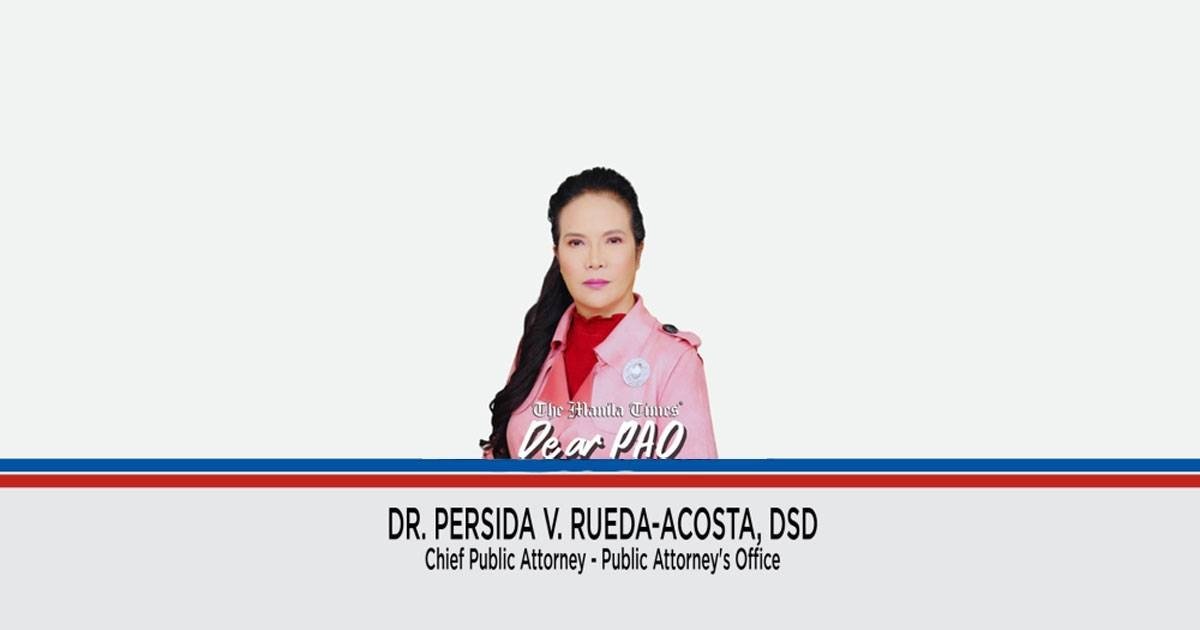Dear PAO,
My father, who is the breadwinner of the family, was arrested by the police for allegedly selling dangerous drugs. After the arrest, he was immediately brought to the barangay hall for the marking and inventory of the seized drugs. According to the police, it cannot be done at the place of arrest because it is a Muslim area; hence, dangerous. Is that justified?
Mona
Dear Mona,
Section 21 of Republic Act (RA) 9165, otherwise known as the Comprehensive Dangerous Drugs Act of 2002, as amended by RA 10640, in part, provides that:
“The apprehending team having initial custody and control of the dangerous drugs, controlled precursors and essential chemicals, instruments/paraphernalia and/or laboratory equipment shall, immediately after seizure and confiscation, conduct a physical inventory of the seized items and photograph the same in the presence of the accused or the person/s from whom such items were confiscated and/or seized, or his/her representative or counsel, with an elected public official and a representative of the National Prosecution Service or the media who shall be required to sign the copies of the inventory and be given a copy thereof…” (Emphases provided)
The law requires the apprehending officers to strictly observe the rule on chain of custody. While it also provides exceptions based on justifiable grounds and provided that the apprehending team demonstrates concrete steps to “ensure that the integrity and evidentiary values of the seized items are properly preserved,” however, deviations based solely on unfounded fear and cultural stereotypes not only fail to meet the requirements of the law, but it also justifies the acquittal of the accused.
In this light, the decision of the Supreme Court in the case of People v. Abdulah, GR 243941, March 11, 2020, penned by Senior Associate Justice Marvic MVF Leonen, is more enlightening, to wit:
“Here, the marking of the seized drugs was not done immediately after accused-appellant’s arrest. In his own words, PO3 Temporal revealed that the team decided to mark and inventory the items at the barangay hall after deeming that the target area to be unsafe, it being ‘a Muslim area’: xxx
“The prosecution’s attempt to justify the delay in marking and inventorying the items is too weak, if not callous, a reason to validate the police officer’s noncompliance with the chain of custody requirements.
“In the recent case of People v. Sebilleno, this Court denounced the prosecution’s reasoning that the target area was a ‘notorious Muslim community’ to justify noncompliance with Section 21. We stressed that such invocation constitutes a bigoted view that only stirs conflict among Filipinos of different religious affiliations.
“To sustain the police officers’ equating of a so-called ‘Muslim area’ with dangerous places does not only approve of a hollow justification for deviating from statutory requirements, but reinforces outdated stereotype and blatant prejudices.
“Islamophobia, the hatred against the Islamic community, can never be a valid reason to justify an officer’s failure to comply with Section 21 of Republic Act No. 9165. Courts must be wary of readily sanctioning lackadaisical justifications and perpetuating outmoded biases. No form of religious discrimination can be countenanced to justify the prosecution’s failure to comply with the law.
“Worse, the manner by which the allegedly seized drugs were handled after their confiscation, and while in transit to the barangay hall, remains unaccounted for. All that was alleged was that PO3 Temporal kept them himself.
“This Court has previously decried police officers’ plain claims of having close, personal custody of allegedly seized items in transit. This lone assertion, as pointed out in People v. Dela Cruz, is ‘fraught with dangers,’ ‘reckless, if not dubious,’ and ‘a doubtful and suspicious way of ensuring the integrity of the items’:”
Applying the aforesaid decision to your case, it is clear that there is no valid reason for the police officers to deviate from the mandate of the law to immediately conduct marking and inventory of the seized items at the place of arrest and seizure simply because the arrest happened in a Muslim area. Deviations based on discrimination and biases not only fall short to the strict requirements of the law but also justify the acquittal of your father.
We hope that we were able to answer your queries. This advice is based solely on the facts you have narrated and our appreciation of the same. Our opinion may vary when other facts are changed or elaborated.
Editor’s note: Dear PAO is a daily column of the Public Attorney’s Office. Questions for Chief Acosta may be sent to [email protected]

